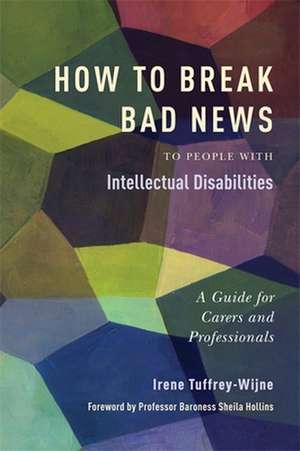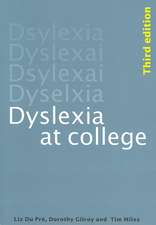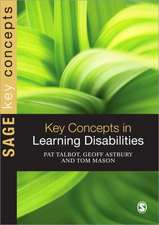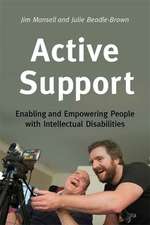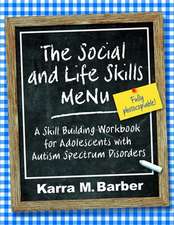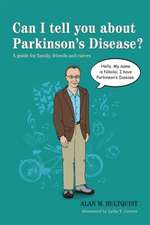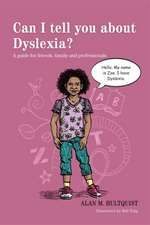How to Break Bad News to People with Intellectual Disabilities
Autor Irene Tuffrey-Wijneen Limba Engleză Paperback – 14 sep 2012
Preț: 164.59 lei
Nou
Puncte Express: 247
Preț estimativ în valută:
31.50€ • 32.61$ • 26.62£
31.50€ • 32.61$ • 26.62£
Carte disponibilă
Livrare economică 12-26 februarie
Preluare comenzi: 021 569.72.76
Specificații
ISBN-13: 9781849052801
ISBN-10: 1849052808
Pagini: 189
Ilustrații: Illustrations
Dimensiuni: 151 x 227 x 11 mm
Greutate: 0.27 kg
Editura: Jessica Kingsley Publishers Ltd
ISBN-10: 1849052808
Pagini: 189
Ilustrații: Illustrations
Dimensiuni: 151 x 227 x 11 mm
Greutate: 0.27 kg
Editura: Jessica Kingsley Publishers Ltd
Notă biografică
Irene Tuffrey-Wijne qualified as a nurse in Amsterdam, and moved to the UK in 1985. She holds a first degree in Palliative Care Nursing and completed a PhD in the palliative care of people with intellectual disabilities at Maastricht University, The Netherlands. Irene has extensive clinical experience in the fields of both intellectual disabilities (as a support worker and home manager) and palliative care (as a clinical nurse specialist at a hospice). She now works as a Senior Research Fellow at St George's University of London, leading a programme of research aimed at improving health care and end of life care for people with learning disabilities. She is chair of the Palliative Care for people with Learning Disabilities Network. She is also author of Living with Learning Disabilities, Dying with Cancer and lives in London with her husband and three children.
Cuprins
Foreword by Professor Baroness Sheila Hollins. Section 1: Background. 1. Introduction. 2. Intellectual Disabilities. 3. What Is Bad News? 4. Breaking Bad News: Knowledge, Skill and Guidelines So Far. 5. Why We Need New Guidelines for Breaking Bad News. Section 2: Guidelines for Breaking Bad News. 6. Overview of the Guidelines. 7. Component 1: Building a Foundation of Knowledge. 8. Component 2: Understanding. 9. Component 3: People. 10. Component 4: Support. Section 3: Using the Guidelines. 11. How Can We Break the Knowledge Down into Chunks? 12. When Can We Start Building Knowledge? 13. Who Can Give Chunks of Knowledge? 14. Who Should Be Told? 15. How Much Can Someone with Intellectual Disabilities Understand? 16. Communicating with People with Intellectual Disabilities. 17. Can Someone Be Harmed By Receiving Too Much Information? 18. Sudden Bad News. 19. What If People Disagree about Breaking Bad News? 20. Some Further Advice. Section 4: Examples of the Model in Practice. 21. Introduction to the Examples. 22. Example A: Jeremy and Christine have cancer. 23. Example B: Ahmed and Carol have to move. 24. Example C: Moira, Ben and Isabel's friend has dementia. Section 5: Appendices. Appendix 1: Flow Chart: A One-Page Overview. Appendix 2: Ten Guiding Questions. Appendix 3: The Mental Capacity Act. Appendix 4: Resources. References.
